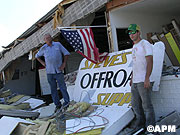 |
| The military barracks at Camp Ripley in central Minnesota could be the temporary home for up to 3,000 survivors of Hurricane Katrina. Minnesota officials say the accommodations are not luxurious, but they're safe and clean, just what people need. (MPR Photo/Tim Post) |
Little Falls, Minn. — The accommodations at Camp Ripley are what you'd expect at military barracks. The walls are simple, gray cinderblock. There are rows and rows of metal-frame beds and group showers that afford little privacy.
But state officials say this is a clean and safe place, just what the victims of Hurricane Katrina need most right now.
On a tour of the barracks, Minnesota National Guard Sgt. Russ Hackett says people will be comfortable here. They can get their meals in this building, and maybe even watch a little TV.
"Basically we are just going to provide the best we can do with everything we have here and do it with a smile on our face and welcome them and hope that we can give them as good of an experience as we possibly can," according to Hackett.
The Federal Emergency Management Agency has asked Minnesota officials to house as many as 5,000 of Hurricane Katrina's victims. Gov. Tim Pawlenty says when they got that request, Camp Ripley was the obvious choice for a home base.
"This was a pretty easy decision because it's a ready-made facility with housing, with dining facilities, with medical facilities, with security arrangements and so it really was the total package at least for the temporary housing that we'll need for the initial welcome and check in and then we'll obviously try to move people into the community as soon as possible," Pawlenty said.
Pawlenty says they've already identified over 1,500 homes, apartments and other long term housing for storm survivors. He says they hope to move people out of temporary housing at Camp Ripley within a few days, or a few weeks at the most. Pawlenty says many of the thousands of hurricane victims headed to Minnesota could become permanent residents.
At first hurricane victims will be flown into St. Cloud, Brainerd and the Twin Cities, from the overfilled emergency shelters in Louisiana, Texas and Mississippi. They'll be take a bus to Camp Ripley north of Little Falls.
They'll fill out some basic paperwork at a welcome center. Then they'll be given ID cards before getting checked out at a medical clinic.
There are 70 medical professionals, among them six doctors, who are volunteering their time at the base.
Dr. Tom Schrup says they're prepared to provide a wide range of medical care.
"Our greatest priority we anticipate are difficulties with treating children and behavioral health issues. Communicable diseases are also a consideration. Fortunately we have excellent resources from the Minnesota Department of Health, public health nursing, just great support," he said.
People needing serious medical care will be transferred to facilities in surrounding communities, or possibly to the Twin Cities. Officials plan to provide for more than just physical needs.
For people under such stress over a thousand miles from home, on a military base in rural Minnesota, there's bound to be a cultural shock.
Officials are working with leaders from the state's African American community to bring a bit of southern culture to central Minnesota.
The Rev. Bob Battle from St. Paul says he hopes to provide survivors with some home-cooked southern food in the form of sweet potato pie. And he plans on catering to survivors' spiritual needs as well.
"Things are going to get better," he said. "We're going through the valley, but we're going to get to the mountain top eventually. People can lose their homes, they can lose their cars, they can lose everything. The last they thing they have is their spirit and that's what we're going to address first."
At this point no one is sure how many storm survivors will make their way to Minnesota, or when they'll arrive. State officials say they think victims of Hurricane Katrina could begin to fly into the state by Thursday or Friday.






